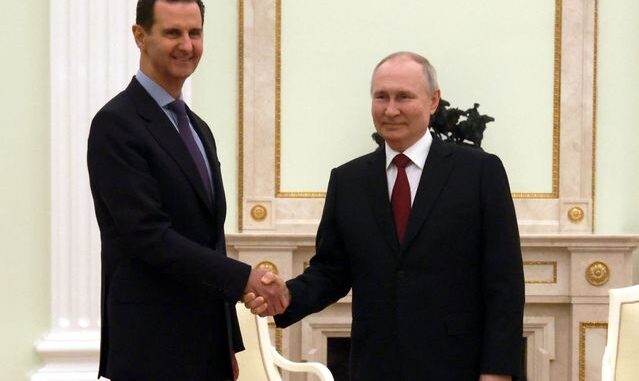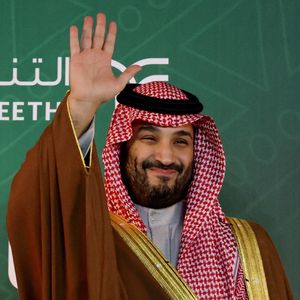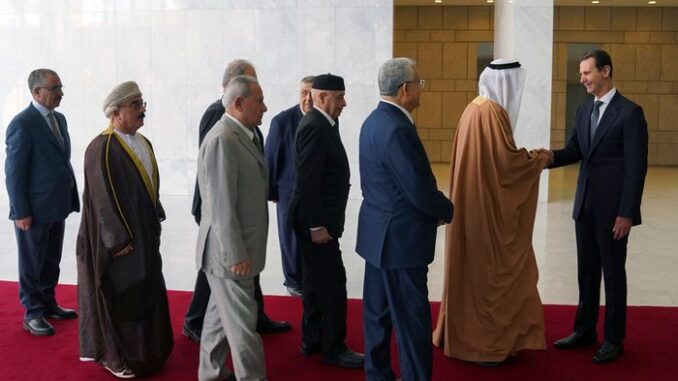The emerging deal could leave the U.S. again on the sidelines during a dramatic shift in the Middle East’s geopolitics
By Summer Said, Benoit Fauconand Michael Amon, WSJ

Syrian leader Bashar al-Assad met with Russian President Vladimir Putin in Moscow earlier this month.PHOTO: VLADIMIR GERDO/AGENCE FRANCE-PRESSE
DUBAI—Saudi Arabia and Syria are nearing an agreement to restore diplomatic ties after negotiations mediated by Russia, according to Saudi and Syrian officials familiar with the discussions, as the geopolitics of the Middle East shift.
Talks were continuing after rounds of discussions in Moscow and Riyadh in recent weeks, the officials said. If a deal is reached, it would mark an important step to reintegrating Syria and its leader Bashar al-Assad into the broader region after a brutal civil war.
Following the Chinese-brokered deal between Saudi Arabia and Iran on resuming ties this month, the emerging Damascus-Riyadh rapprochement, if it sticks, would leave the U.S. on the sidelines again on another major Middle East development.
Saudi and Syrian officials said negotiators are aiming to conclude a deal before a potential visit by Saudi Foreign Minister Faisal bin Farhan to Damascus after the Muslim holiday of Eid al-Fitr in late April. But they cautioned that the discussions could still break down.
Saudi state television reported Thursday night that negotiations have started with Syria to resume offering necessary consular services for both countries, citing a source at the foreign ministry.
Saudi Arabia and Syria cut ties in 2012 over Mr. Assad’s response to political protests that emerged from the Arab Spring uprising and his actions in the ensuing civil war. The Saudis helped orchestrate Syria’s ejection from the Arab League and funded rebels fighting Mr. Assad’s forces for years.
The Russian government brokered a preliminary agreement when Mr. Assad visited Moscow last week, said officials from Saudi Arabia, Syria and other Arab countries involved. Senior Syrian officials then visited Saudi Arabia in recent weeks.
If a formal agreement is reached, a vote on reintegration of Syria into the broader region and its reconstruction will be on the agenda of the next Arab League summit expected in May in Saudi Arabia, according to Arab officials.
Much of the Arab world has moved to set aside the rivalries that plunged the region into chaos following uprisings that began in 2011 and toppled several Middle Eastern governments. Mr. Assad has been in talks with several Arab countries to end more than a decade of isolation, and the Saudi foreign minister recently said the status quo with Syria wasn’t sustainable.
Iran also encouraged Syria to strike a deal with Saudi Arabia after Riyadh and Tehran agreed to resume diplomatic ties after a seven-year hiatus, said an Iranian official and Syrian government advisers. Other Arab countries such as Oman and Jordan have also backed the rapprochement between Damascus and Riyadh, said Arab officials familiar with the talks.
The main focus of the talks has been security, Syrian government advisers said. The kingdom wants to resolve the issue of Saudi detainees who were captured after joining jihadist groups involved in the civil war, these people said. Damascus is seeking Riyadh’s help to cut off funding for and recruitment of fundamentalist factions fighting in Syria, the officials said.

Saudi Crown Prince Mohammed bin Salman has tried to avoid being pulled onto any one side since the start of the Ukraine war.PHOTO: AHMED YOSRI/REUTERS
Any agreement between Saudi Arabia and Syria, brokered by Russia, would represent another splashy diplomatic move by Saudi Crown Prince Mohammed bin Salman. The 37-year-old who rules the oil-rich kingdom day-to-day for his aging father, King Salman, has reset relations with Washington, long the Saudi’s protector in the Persian Gulf, and developed closer relations with Russian President Vladimir Putin and Chinese leader Xi Jinping since the beginning of the Ukraine war.
Prince Mohammed faced diplomatic isolation for several years after Saudi agents killed journalist Jamal Khashoggi in Istanbul in an operation that the U.S. intelligence community concluded was ordered by the royal. The Saudi government says that Prince Mohammed wasn’t involved and that the perpetrators were brought to justice.
Prince Mohammed has tried to avoid being pulled onto any one side since the start of the Ukraine war. He has used the war as an opportunity to forge an independent foreign policy that leverages Saudi Arabia’s status as the world’s largest oil exporter. The Syria talks come after Prince Mohammed greenlighted a detente with Iran in a deal brokered by China.
“Oil exporters and authoritarian states have more in common than the democratic West, with their use of sanctions and perceived hypocrisy on respect for sovereignty,” said Karen Young, senior research scholar specializing in the Middle East at the Center on Global Energy Policy at Columbia University. In the Middle East, she said, “the general trend is a consensus on noninterference in domestic affairs as a principle.”
Mediating between Saudi Arabia and Syria bolsters Russia’s presence in the Middle East. Mr. Putin’s air-power intervention in the Syrian civil war proved decisive for Mr. Assad, and he has courted the Saudis, aligning oil-rich Russia with the Riyadh-led Organization of the Petroleum Exporting Countries.
For the U.S., the deal is a reminder that, while it remains the pre-eminent military and diplomatic force in the Middle East, its influence there is waning.
The U.S. still has troops in Syria, where they are conducting antiterrorism operations in the country’s southeast and with Kurdish-led forces in the northeast. But Washington has long signaled that it wants to focus more on Russia and China and less on the region’s messy affairs, and the shift was illustrated Thursday when The Wall Street Journal reported that the U.S. will send aging attack planes to the Middle East and swap out the more advanced combat aircraft there now.
“The most important single factor affecting the region is the perception of American withdrawal, which creates a vacuum that other countries can step into,” said William Wechsler, a former U.S. Defense Department official and now director of the Rafik Hariri Center and Middle East Programs in Washington.

Syrian President Bashar al-Assad received in Damascus last month a delegation representing various Arab parliaments.PHOTO: ASSOCIATED PRESS
The Middle East has undergone a dramatic realignment in recent years. The Saudis patched up a diplomatic spat with Qatar, Persian Gulf countries have begun setting aside longstanding differences with Turkey, and conflicts in Libya, Yemen and Syria have largely cooled down.
The U.S. remains engaged in trying to broker a normalization deal between Israel and Saudi Arabia, but there are high hurdles.
“After the Saudi-Iran pact and now a prospective rapprochement between Syria and the kingdom, the U.S. is increasingly diplomatically sidelined,” said Fabrice Balanche, a Middle East-focused assistant professor at the University of Lyon 2 in France. “Middle East nations are making peace without Washington.”
For Mr. Assad, a deal with Saudi Arabia would be one of the final demonstrations that he prevailed in a grinding 11-year civil war, not just against the rebels but also against an array of foreign actors, including the U.S. and Saudi Arabia, who called for his removal from power.
Mr. Assad used a devastating earthquake in his country’s north last month to make a push for normal diplomatic relations, visiting Oman and the United Arab Emirates in recent weeks. But he remains a pariah in most of the world, with overwhelming evidence that he used chemical weapons on Syrians and oversaw the killing of tens of thousands of civilians.
Write to Summer Said at summer.said@wsj.com, Benoit Faucon at benoit.faucon@wsj.com and Michael Amon at michael.amon@wsj.com



Leave a Reply
You must be logged in to post a comment.